Brian's Guide to Investing and Stock
(9/17/2012)
![]()
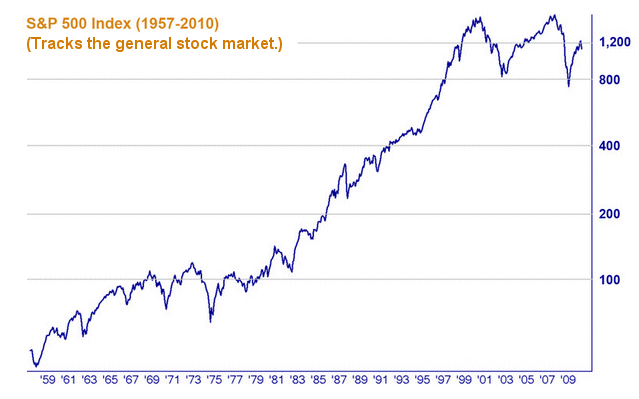
Brian's Guide to Investing and Stock(9/17/2012)
|
 |
From time to time people ask me where I invest my money and why. This web page is meant to explain my philosophy. You can also click on this movie below to see my philosophy:
This highest quality "original" of this movie is found here.
Here are a few principles I invest by:
Investing is boring. - I define "investment" as a place to store extra money where it returns a nice slow, regular income back to me in the long run with very little management or work. There are many ways to get rich quickly, but none of them are called "investing". You can get rich quickly at a software startup (so it is not "investing"), or you can go to Las Vegas and bet on roulette (so it is not "investing").
Start early and small. - If you invest $250 every month, at 10 percent interest, you will retire after 30 years with $1.5 million. Try this retirement calculator.
You cannot "time the markets", so make long term investments. - There is no good time to invest or bad time, there is only "the long term". This applies to real estate, stocks, anything. If you need the money anytime in the next few years, you shouldn't invest it, it should be in cash or a checking account.
You cannot choose individual stocks, but the stock market in general rises by 10 percent per year - There is no way a "regular" person like you can know whether an individual stock will increase in value over time or decrease. But over the long term, the stock market averages a 10 percent rate of return.
Over the long term, the stock market tends to return about 10 percent interest per year. The problem is that this is the average rate of return of all stocks, but for any one company (Apple, Facebook, Chevrolet) it might drop dramatically. The solution is to purchase what are called "Mutual Funds" that are comprised of many stocks. An "indexed mutual fund" is very simple: a computer chooses all the stocks according to a simple formula, like "the largest 3,000 companies on the stock exchange". For example, the "Russell 3000" is a selection of 3,000 different stocks (representing 98 percent of the USA stock market), and in the last 10 years it has returned about 8% increase (annually) if you invested in a Mutual Fund that tracked that particular index. The "Russell 2000" are the 2,000 SMALLEST stocks found in the Russell 3000, and if you invested in an index fund that tracked the Russell 2000 then you would have made just shy of 10% (annually).
Below is a graph showing the historical growth of the stock market. There was really only one terrible time to invest, and that was right before the 1929 Stock Market Crash
There are many good mutual fund companies, I happen to invest in Vanguard because their "management fees" are very low and they are the largest and most trustworthy (in my humble opinion). But there are other good choices, such as "Fidelity Mutual Funds" and "Franklin Funds" and a few hundred others.
So my idea is to try to represent the global stock market without getting too crazy. So I split my money evenly among the following mutual funds:
Large company USA Stocks - Symbol: VWUAX - "Vanguard US Growth Index Admiral Shares"
Medium company USA Stocks - Symbol: VIMAX - "Vanguard Mid-Cap Index Fund Admiral Shares"
Small company USA Stocks - Symbol: VSMAX - "Vanguard Small-Cap Index Fund Admiral Shares"
International Stocks - Symbol: VWILX - "Vanguard International Growth Fund Admiral Shares"
European Stocks - Symbol: VEUSX - "Vanguard European Stock Index Fund Admiral Shares"
Pacific Rim (Japan, Hong Kong, etc) - Symbol: VPADX - "Vanguard Pacific Stock Index Admiral Shares"
To get started, you might consider just purchasing a single broad fund like VTSMX - Vanguard Total Stock Market Index.
Below are some graphs of how these funds have done over the last 10 years. Notice that events like the 2008 Financial Crisis hurt all the funds specifically in 2008, but if you look at any 10 year timeframe ALL these investments have more than doubled in value, and some have quadrupled. In the end, my goal of investing is to be pretty boring, invest for the long term, and try to get somewhere in the 10% return with NO ACTIVE MANAGING of funds (zero expertise required by an investment advisor), it should all be done by computer based on some index.
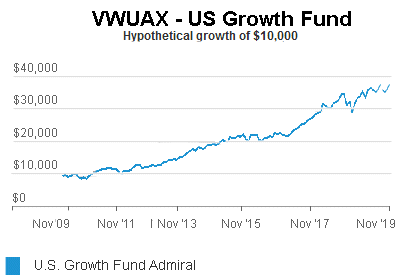
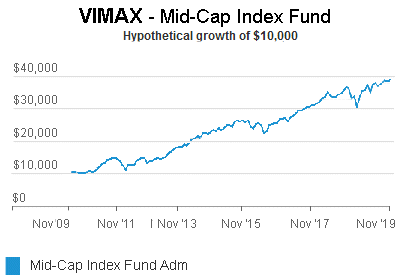
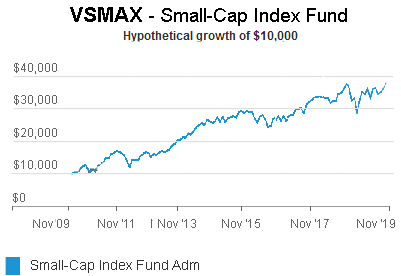
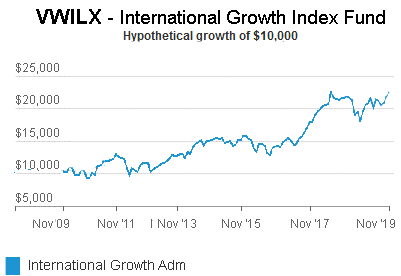
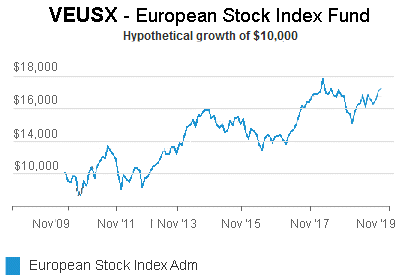
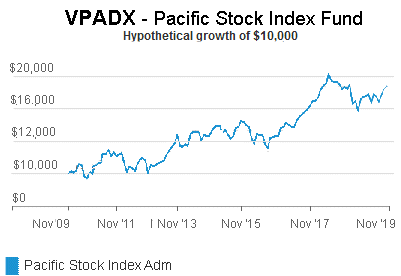
I live near San Francisco and I have worked for several startup companies (currently Backblaze) over the last 15 years. Part of our world is that we get stock options in the startup companies. Here are some generally accepted "rules to handle stock options" that pretty much every experienced startup employee follows:
Terminology: "Founders" are defined as people who went some period without any salary at all to bootstrap up a startup.
General Rule of Thumb: After the first $5 million - $10 million round - Founders own 30 percent of a startup, Venture Capitalists buy 50+ percent, remaining 20 percent goes to employees with a CEO "non-founder" probably getting 5 - 10 percent of the total company all to him or her self.
Stock Grant Guideline: The first 30 Software engineers each get 1/3 of 1% (0.003) of the company.
ABSOLUTE RULE: Founders exercise all initial stock options because they are priced at 1/10th of 1 penny each. This leads to lower taxes later (long term cap gains).
ABSOLUTE RULE: Founders File an 83b.
RULE OF THUMB: Employees with an exercise price of 15 cents or lower per share can choose to exercise ONLY in their very first month of employment. If you exercise File an 83b. If you wait too long (more than a month) then the company's value per share will rise and your taxes will get complicated and it is no longer worth it. If you are joining the startup later and the exercise price has risen past 15 cents, see rule #7 below.
ABSOLUTE RULE: Nobody except the founders and very early employees should exercise stock options earlier than the last possible moment. The only reason to exercise and hold is to hold more than one year to achieve lower taxes, but that is a TERRIBLE DECISION that no experienced accountant or startup veteran would ever recommend. There are horror stories of people who tried this and were hit with more taxes than the stock was worth. Google it, it is a horrible mistake.
COMMON BATTLEFIELD WISDOM bordering on ABSOLUTE RULE: After a liquidation event (like IPO), founders and employees should sell stock. Stock price or trends are not important. What is most important is if this one stock represents more than 50 percent of your total net worth, you need to aggressively get it to be less than 50 percent of your net worth relatively quickly (think weeks or at most a month or two). So, for example, if you have savings of $100,000 and $1 million in newly IPO'ed stock, you need to be aggressively selling AT LEAST $450,000 worth of stock so that you have $550,000 worth of stock left and $550,000 worth of cash (including your original cash). Any other course of behavior borders on insane denial.
That's it!!